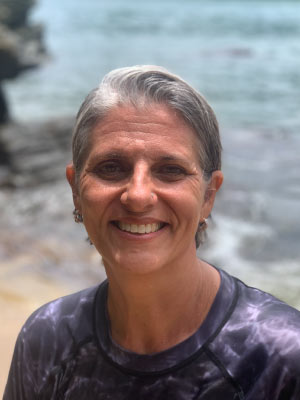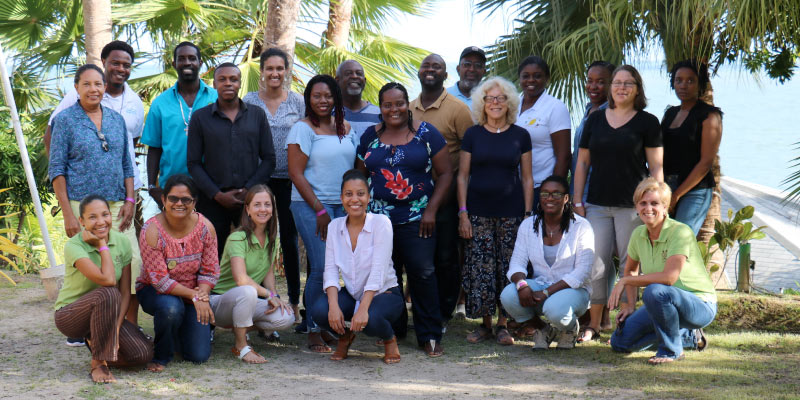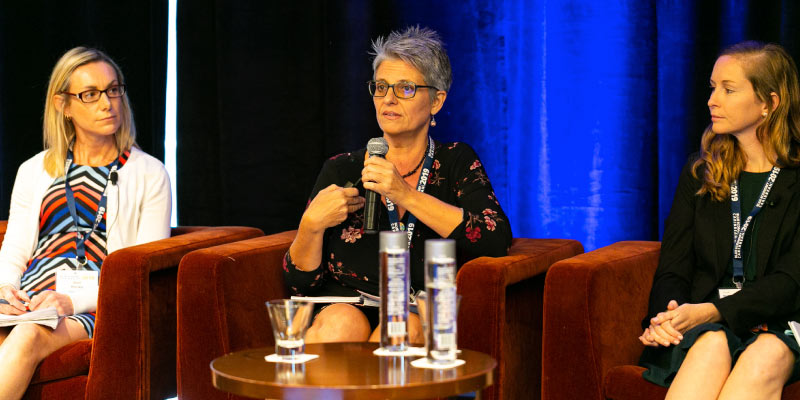
On the north coast of Trinidad, there’s a long, remote stretch of beach. Unlike most of island’s beaches — taken over by resorts — this one lies pristine, undeveloped. Behind the white sands and the sparkling blue of the Caribbean Sea, the beach is flanked by lush, green mountains. It’s a rare sight in the Caribbean, but Trinidad was once connected to South America’s mainland (Venezuela is less than 10 miles offshore) and retains much of the continent’s biodiversity. For Nicole Leotaud, the beach is her church. “The Caribbean is beautiful,” she emotes, and she’s dedicated her career to keeping it that way.
The two-island nation of Trinidad and Tobago is Leotaud’s home. It’s where she grew up, where she went to university for her first degree, and where she found her calling for conservation. “It’s so different to grow up in an island and to grow up in a country that’s still developing,” she says, reflecting that in a country that’s faced with myriad challenges, it’s hard to not become an activist in one form or another. “You just are immersed in an environment where you become an activist almost. I don’t see how people are not,” she says. Leotaud’s first step was enroll at the University of the West Indies where she studied biology. For her, a science education was always applicable; never abstract. “You want to deal immediately to have impact, to stop things that you see are destroying the environment or destroying people,” she says. “It’s not a theoretical thing where [you say], ‘I’m concerned about forest in the Amazon.’ No, I’m looking at the area,” she gestures outside her window, “and I’m seeing fire burning. It becomes very real for you.”
By happenstance, while Leotaud was at the University of the West Indies, so was Stanley Temple, professor emeritus of UW–Madison’s Nelson Institute and the College of Agricultural and Life Sciences. After analyzing different islands for their biodiversity and where he could have the most impact, Temple had chosen Trinidad for a year’s long Fulbright sabbatical. “You have to understand, the universities here are so narrow. There’s only a few professors,” Leotaud explains. So given the opportunity to network with a world-class researcher, she jumped at the chance. “What should I do?” she asked him when she was offered a Fulbright scholarship for master’s study in the U.S. He told her, “You can do anything.”
Watching how Temple learned from and genuinely engaged with her community, Leotaud was inspired. “I think he had a huge impact on a bunch of people here, and I was one of them,” she says. After earning her bachelor’s degree, she headed north to continue her education at Temple’s stomping grounds by entering the Nelson Institute’s conservation biology and sustainable development master’s program. Apart from one trip to Florida, Leotaud hadn’t traveled outside of Trinidad and the Caribbean. The culture shock was big, but not as traumatic as the change in climate. “When I left [Madison],” she remembers, “I told people, ‘I’m never coming back. I love all y’all, my friends, but I’m not coming back. It’s too cold!’ ”

And she didn’t — after earning her master’s in 1996, Leotaud took her new knowledge back to the Caribbean where she’s been working in conservation and sustainable development since. For nearly two decades, she’s worked for the Caribbean Natural Resources Institute — or CANARI — the region’s leading environmental, nonprofit, technical institute. With just over 20 staff members, CANARI works across the entire Caribbean, plus neighboring continental nations like Belize, Guyana and Suriname, to equitably and effectively manage the Caribbean’s resources. Leotaud started with CANARI as a senior technical officer, but now she leads the organization as its executive director. When she took the helm in 2010, she inherited a clear vision and strong set of values that she upholds today. “We have a fancy mission statement about facilitating and promoting stewardship of ecosystems and all of that,” she says, but at the end of the day, “it’s participation, it’s voices, it’s empowerment, it’s justice.” Whether they’re working to restore forests or advocate for sustainable tourism, the topic is often secondary; for both CANARI and Leotaud, the work is about the people. “We’re a technical institute,” Leotaud explains, “but we operate very on-the-ground with people. It’s about relationships.”
By nature of the Caribbean’s geography, interisland relationship building can be a challenge. “The U.S. is such a big country. You get in a car, and you drive. You don’t understand what it’s like to live on an island,” Leotaud explains. “There are not ferries between most of the islands. You have to get a passport; you have to get on an expensive plane and fly somewhere. It’s not easy. The connections among the islands are still hard for people who are not middle class or have those privileges.” That’s where CANARI comes in. Leotaud and her team go out to the islands to find community and national-level civil society organizations — or nonprofits — across the Caribbean, then connect them back with resources and expertise.
To connect locals with experts, Leotaud acts as a facilitator and a “translator,” living out her first goal of keeping science actionable. “I could bring an expert researcher, some amazing academic, in the same room with fishers, farmers, local community people, government people, nonprofit people, NGO people, and facilitate a conversation where people are understanding each other,” she says. “We need the science, but if it’s not translated so people understand it and can use it, then there’s no point doing it.”

But Leotaud knows that scientists and academics aren’t the only ones who have knowledge to share. CANARI places a large emphasis on local knowledge, another driver in their place-based approach. “It’s a very valid form of knowledge,” Leotaud stresses. One way that CANARI collects local knowledge is through using participatory geographic information system (GIS) approaches, which capture local knowledge from folks on the ground and logs it into a GIS map to be combined with scientific knowledge. Leotaud remembers an early project where she talked with farmers about how their planting seasons were changing. “They didn’t know why. They didn’t know it was because of climate change, but they knew what was happening. You have to be asking questions and listening to people to understand what’s happening, and then be able to put it in a context and bring science in,” she says. “You learn a lot from people on the ground. They know more than you do as an outsider, for sure!”
Leotaud’s leadership with CANARI and across the Caribbean recently led to her being elected as a public representative to the groundbreaking Escazú Agreement, a regional treaty enacted in 2021 that solidifies the rights of all Latin American and Caribbean peoples, present and future, to live in a healthy environment. The treaty also protects “environmental defenders,” or people who are environmental advocates or activists — like the folks Leotaud supports daily through CANARI’s work.
From academics to politicians to community leaders to fisherfolk, the Caribbean people are at the heart of all that Leotaud does. “The Caribbean has a tremendous sense of identity and common culture and unity,” she says. “What’s been most impactful for me has been where I could see affecting people’s lives in a local community.” She has a favorite story to tell about seeing this kind of impact play out. In 2011, CANARI brought officials from governments and United Nations agencies to a Community Expo to dialogue with rural community entrepreneurs in Trinidad and Tobago about what they needed to build sustainable livelihoods. The group met at a small, outdoor venue, and gathered on benches underneath a bamboo canopy. The officials thought they’d be doing the talking, but arrived and were told to sit down and listen. “We flipped the tables totally. The big people came in their suits and their high heels, and they were sweating, sweating under the bamboo,” Leotaud laughs. With tears in their eyes and full of emotion, the community members shared their experiences with the officials. Then, under the bamboo, the group shared a meal made by the communities. At the end of the meeting, an older man named Smokey — an eccentric character from Tobago — came up to Leotaud. “This is the best day of my life,” he said passionately. “Smokey … I’ll never forget him,” Leotaud says. “When you can touch somebody like that, it’s not the big projects or the big technical report. It’s people.”
Nicole Leotaud is one of six Nelson Institute alumni award winners. Their stories are featured throughout the Commons magazine and online.